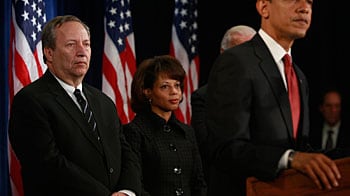
Economist Larry Summers was all over Washington this week, appearing on Meet The Press as point man for President Obama’s economic agenda and reclaiming some of the respect he commanded as an economic wunderkind in the Clinton years. It is a remarkable resurrection for a man whose rocky five-year tenure as the president of Harvard University left his public image in tatters. Ironic though it may seem, the political capital of the country, not the academic capital, might be the easier place to succeed solely by dint of intellect, making it more hospitable to Summers’ brash and nerdy personality.
That may seem puzzling at first blush. If a lack of political tact and impatience with bureaucracy are disabilities in the ivory tower, they would seem even more so in the federal government. But one key difference between Cambridge Larry and Washington Larry, both in this go-around and the last, is the size of his portfolio. The Harvard job required Summers to play nice with everyone from the African American studies faculty to professors of Shakespearean literature while maintaining the basic social graces. And neither of those were his strengths. Once, while discussing an issue with senior faculty in the humanities, Summers managed to commit two faux pas at the same time—at least in the eyes of the urbane professors—when he asked, through a mouthful of cookies, what the word “syntax” meant.
Robert Rubin, a distinguished alumnus and donor, phoned the Harvard University selection committee to reassure them that Summers had mellowed during his time in Washington.
In Washington, Summers has the luxury of being surrounded by policy geeks who actually enjoy crunching numbers, and who are willing to look past his abrasive manner and “unique” eating style. "Even when others lined up against him, like when he as being forced out of the presidency, Larry never lost that brilliant coterie of folks that deeply respects him," explains David Gergen, who himself is part of that special tribe that move seamlessly between government and academia. Summers helped foster this group, recruiting several of his Washington colleagues to Harvard posts, and he is now poised for a reverse encore as he leads many of them back to the banks of the Potomac.
The Obama appointees that Summers has mentored, taught or employed include Tim Geithner, who was confirmed this week as secretary of the Treasury and worked under Summers in the Clinton Treasury Department; incoming OMB chief Peter Orszag, who worked with Summers on the Hamilton Project, an intellectual endeavor to put the meat on the bones of center-left economic policy; incoming director of the Congressional Budget Office Doug Elmendorf, who took Harvard courses from Summers; Nancy Killefer, the White House’s chief performance officer, a good friend of Summers who was assistant secretary for management and chief financial officer at the Treasury Department from 1997 to 2000; and incoming Solicitor General Elena Kagan, whom Summers appointed dean of Harvard Law School after working with her in the Clinton White House. )
The Obama team, which has described Summers as “brusque,” is certainly mindful of the controversies in Cambridge, where Summers, with just a few poorly-chosen words on women's scientific abilities and a few poorly-chosen battles over Israel, the military, and the role of cultural studies, alienated the humanities faculty and virtually the entire academic left. Summers often dozed off when others were speaking—even during a meeting of the Board of Overseers. When he was awake, he frequently looked restless or bored.
To avoid a rehashing of these difficulties, Obama has given Summers a job that does not require Senate confirmation but has extremely wide range over the administration’s economic policy: Chairman of the National Economic Council. Summers’ influence is likely to be greater than ever because nearly all the Obama appointees to economic posts are Summers’ friends or protégées.
These colleagues are united in the view that, as Kagan has said, Summers has had “a bum rap” due to his time at Harvard. But good timing is also a big factor in his sudden rehabilitation: The market meltdown has put a premium on his vast understanding of the economy, and, after eight years of disastrous Republican rule , Summers’ brand of policymaking is back in vogue.
In late 2000, Harvard was choosing between two candidates to be the next president: Lee Bollinger, the widely-admired head of the University of Michigan, and outgoing treasury secretary Summers, who some feared would antagonize the faculty with his brash arrogance. Summers' mentor and friend, Robert Rubin, who is also a distinguished Harvard alumnus and donor, phoned the selection committee to reassure them that Summers had mellowed during his time in Washington.
He had not, and likely never will. But Summers may nevertheless have gained a little self knowledge so that, in returning to Washington and the company of geeky technocrats who appreciate his brilliance, he will have in mind the words he uttered upon taking the Harvard presidency: “It's good to be home.”
Paras D. Bhayani is a senior at Harvard and served in 2008 as managing editor of The Harvard Crimson, the university's daily newspaper.





